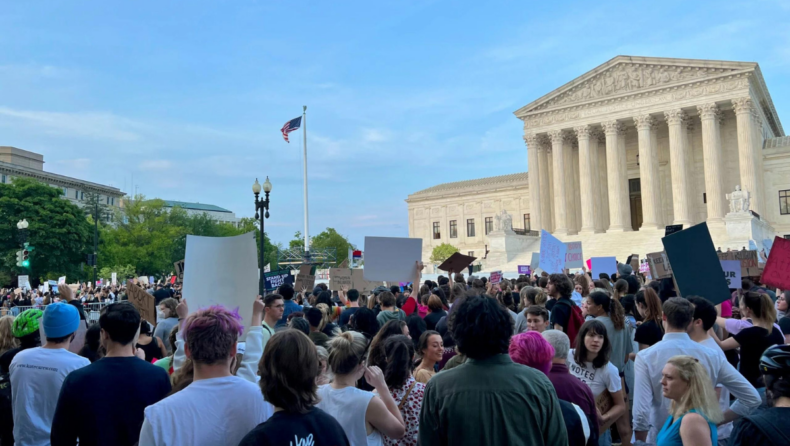Kansas holds the nation’s first test of voter sentiments regarding the Supreme Court’s decision to overturn Roe v. Wade on Tuesday, with statewide voters deciding whether to allow their conservative legislature to further restrict or ban abortion.

The proposed anti-abortion amendment to the Kansas Constitution is being closely monitored as a barometer of liberal and moderate voters’ anger over the June ruling that overturned the national right to abortion. Given Kansas’s conservatism and the fact that twice as many Republicans as Democrats have voted in the state’s August primaries over the past decade, it’s possible that the outcome does not reflect national sentiments.
Supporters of the measure wouldn’t say prior to the vote whether they intend to pursue a ban if it passes, but they have spent decades pushing for new restrictions nearly every year, and a number of states in the Midwest and South have banned abortion in recent weeks. By not stating their position, they hoped to win over voters who supported certain restrictions but not a complete ban.
Abortion rights advocates expect the legislature to ban abortion if the ballot measure passes, and the electorate was more Democratic than usual during the surge of early voting.
Overland Park physical therapist Chandler Alton, age 28, voted against the abortion measure on Tuesday.
Alton stated that abortion is health care and the government should have no say in whether women receive potentially life-saving care, adding that she would vote for candidates who wouldn’t “let this kind of thing happen.
On Tuesday morning, there were reports of longer lines than usual for a primary election, with some polling locations experiencing unusually high turnout. In Kansas, primary elections are typically restricted to the two major parties, but independent voters can participate in this election for the constitutional amendment.
Advance voting and mail-in ballots increased in Sedgwick, Johnson, and Wyandotte counties in comparison to the 2018 primary election. Michael Abbott, the election commissioner for Wyandotte County, stated that he is quite pleased with how well everything is running, given how hectic things are.
Democrat Stephanie Kostreva, a 40-year-old school nurse from Olathe who is a Christian and believes that life begins at conception, stated that she voted in favor of the measure.
“I do not believe that abortion should never be legal,” she said. “I understand there are medical emergencies, but there is no reason for two people to die when the mother’s life is in danger.
Cris Paden, a spokesman for Twilio, said in an email that an anonymous group that sent a misleading text message to Kansas voters urging them to vote yes in order to protect choice was suspended from the Twilio messaging platform late Monday, preventing it from sending new messages.
Twilio determined, without identifying the sender publicly, that the account violated its acceptable use policy, which prohibits the dissemination of disinformation.
According to the Kansas City Star, the text was sent to voters throughout the state, including former Democratic governor Kathleen Sebelius. The principal no campaign, Kansans for Constitutional Freedom, described the text as an example of desperate and deceitful tactics.
The Kansas secretary of state’s office stated that it has received calls from the general public regarding the texts and acknowledges their concerns. However, state law prohibits the… office from regulating campaign advertisements or messaging. The Kansas Governmental Ethics Commission also tweeted that text messages advocating for constitutional ballot initiatives do not require attribution under current law.
The Kansas measure would add language to the state constitution stating that it does not grant a right to abortion, allowing legislators to regulate the procedure as they see fit. In November, Kentucky will vote on adding similar language to its constitution.
Vermont will decide in November whether to add an abortion rights clause to its state constitution. In Michigan, a similar question will likely appear on the ballot in November.
The Kansas legislation is a response to a 2019 state Supreme Court ruling that abortion access is a matter of bodily autonomy and a fundamental right under the state’s Bill of Rights.
Together, both sides have spent over $14 million on their campaigns. Abortion providers and abortion rights organizations were major contributors to the no side, whereas Catholic dioceses funded the yes campaign extensively.
Even though some early voters support a ban on virtually all abortions, the vote yes campaign pitched its measure as a way to restore lawmakers’ ability to set reasonable abortion limits and maintain existing restrictions.
Kansas does not prohibit the majority of abortions until week 22 of pregnancy. Due to legal challenges, a law that would prohibit the most common second-trimester procedure and another that would impose special health regulations on abortion providers are on hold.
Monday, White House press secretary Karine Jean-Pierre commented on the Kansas vote: “If it passes, tomorrow’s vote in Kansas could result in another state eliminating the right to choose and eroding access to health care.”
Since the early 1990s, the Republican-controlled legislature has had anti-abortion majorities. Governor Laura Kelly, who was elected in 2018, is a Democrat, and abortion opponents have felt constrained by previous federal court decisions or by the fact that she is a Democrat.













